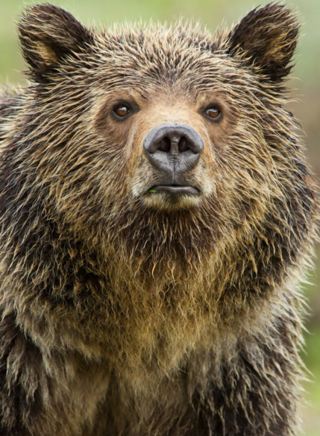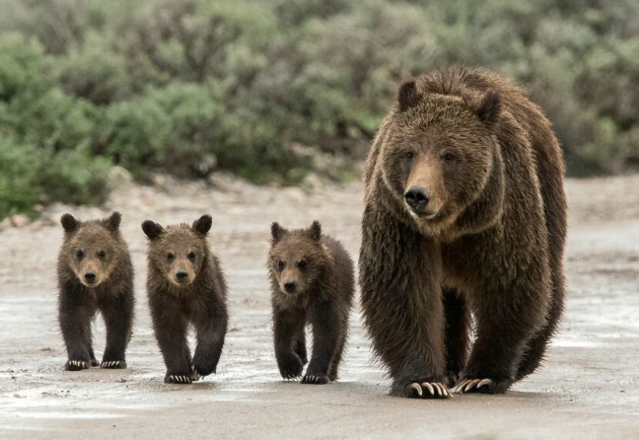Ethics and Morality
Hunting Grizzlies For Fun is Unscientific and Unethical
Science and ethics tell us trophy killing these magnificent bears is wrong.
Posted August 22, 2018
Updated September 25: The hunt has been suspended and judge returns grizzly bears to the endangered species list.
The first grizzly bear hunt in Wyoming for over 40 years ignores the questionable conservation status and emotional capacities of these iconic animals1
Some people like to kill nonhuman animals (animals) as trophies for recreation, sport, and fun. How else could anyone explain the fact that 21 people who paid a lot of money for a hunting permit will be allowed to trophy hunt/kill grizzly bears in Wyoming beginning this September -- unless federal court judge Dana Christensen intervenes on August 30 -- now that these magnificent carnivores are no longer protected by the Endangered Species Act? It will be the largest grizzly hunt in the lower 48 states in 44 years. In 6 hunting areas closest to the Grand Teton and Yellowstone National Parks, 10 permit holders, one at a time, will be allowed to hunt for 10 days and the hunt will end after 10 males or one female is killed. Farther from the parks, up to 12 bears can be killed, male or female. There will be no hunting in the parks. Research has shown that the reason some people engage in trophy hunting is for status and to show others they can absorb the cost of the activity -- that they've "been somewhere and done something."

The upcoming trophy hunt (an activity for which Cecil the lion who was killed in South Africa has become a world renown “poster child”-- some say "poster corpse"; also see) raises many important questions about nonhuman animal (animal)-human relationships in the biological sciences, including cognitive ethology (the study of animal minds and animal emotions) and in philosophical inquiry centering on the ethics of humans choosing to kill other animals for fun. It reeks of human domination over other nature, and our ability to do anything we want and to choose who lives and who dies. It’s a good example of what is happening in an epoch called the Anthropocene, or the “age of humanity.” In truth, the Anthropocene is the “rage of inhumanity.” People who are against the hunt failed to convince the authorities that it shouldn’t be held for scientific and ethical reasons.

Many bear biologists and others who are familiar with grizzly behavior, behavioral ecology, reproductive behavior, and population dynamics are extremely leery about the hunt although not all of them are anti-hunting. Those who support the hunt are paying a dangerous and highly questionable numbers game. For example, currently there are around 700 bears, up from an estimated 136 in 1975 when they were placed on the Endangered Species List. People are concerned that 700 is not a sustainable number of these magnificent predators and the science tells us that we ought not be killing these animals. Furthermore, currently, the population is not growing because of climate change resulting in the loss of food including white bark pine and their nuts and cutthroat trout.
Of course, not only will the bears themselves be killed, but there also will be “collateral damage” because it’s highly likely that other individuals will be negatively affected, including the some of the bears' cubs, including those who may be born this winter. Seeing a female without cubs does not mean there aren't cubs around. Furthermore, it’s very difficult to distinguish a male from a female unless there are cubs. Consider the Grand Teton's Park iconic female bear 399, who could potentially go into the hunting area following the scent of elk gut piles left behind by hunters. She has lost around one-half of her descendants most likely due to conflicts with people according to award winning wildlife photographer and bear expert Thomas D. Mangelsen, who has been following her for eleven years (for more details please see "Should Grizzlies in the Yellowstone Area Be Trophy Hunted?"). Mr. Mangelsen is a vocal opponent of the impending hunt, and along with Dr. Jane Goodall, he bought a lottery ticket for a hunting permit. The chances of either of them receiving a permit was about 22/7000, yet Mr. Mangelsen received one so that he could shoot bears with his camera. Wyoming Game and Fish admits they didn't break any rules, but were not particularly happy about permits going to non-hunters. I like this sort of peaceful activism. Across the country in New Jersey, Professor CUNY Professor of Psychology Bill Crain was arrested after he protested a black bear hunt in his state.
Slaughtering bears is not “killing in the name of conservation” or “killing in the name of coexistence.” Since 1980, just 38 people of more than 100 million visitors to Yellowstone have been injured by grizzlies. (For more discussion please see Ted Kerasote's essay called "Rug Hunting in Grizzly Country.") Rather, it is killing for fun. Some people feel the bears have recovered, so it’s okay to kill them. This “recover/kill” cycle is one in which a number of animals find themselves trapped by humans who like to kill them. Furthermore the money that’s collected for the coveted hunting permits does little or nothing for conservation of the bears. It won't go far at all and is a tiny fraction of that brought in by tourism.
In addition to being “bad biology,” the hunt ignores that individual bears will suffer greatly, not only when they're shot, but also while they’re stalked and pursued before they’re killed. Mr. Mangelsen notes that bears consider a gunshot a “dinner bell” rather than a warning or something to avoid, because after elk are shot there are gut piles from unretrieved carcasses .
Grizzly bears are sentient beings who care very much about what happens to themselves, their family, and their friends. This is where questions about ethics raise their heads, namely, “Is it wrong to intentionally kill other animals for recreation or for fun?” Many hunters agree that it is wrong, and so too do compassionate conservationists. Compassionate conservation is founded on ethical guidelines including “First do no harm” and the lives of each and every individual matter because of their inherent value (for more discussion please see "Compassionate Conservation Matures and Comes of Age," "Killing 'In the Name of Coexistence' Doesn't Make Much Sense," "Summoning compassion to address the challenges of conservation," and links therein). Each individual is important because she or he is alive, so the bears who may be killed should be left alone. Many philosophers also agree that intentionally harming and killing other animals is immoral. I wonder if those supporting the hunt would also support killing dogs for fun. Bears are no less sentient and don't suffer less than the companion animals with whom we share our homes.
Tourism also is important. Numerous people travel to the Yellowstone region to see the magnificent animals who live there, and there is no reason why they should be robbed of the opportunity to see them in the natural habitats. Losing even one bear could rob them of the opportunity to see a grizzly. Surrounding states have not followed in Wyoming’s footsteps. Idaho is allowing one male to be killed and Montana rejected all hunting. This year British Columbia has stopped their long tradition of sport hunting grizzlies because of public sentiment. Let's hope federal court judge Dana Christensen will take advantage of working on the bears' behalf and will take the opportunity to stop Wyoming's hunt on August 30.
Camilla Fox, Founder and Executive Director of Project Coyote, captures many of the reasons why the grizzly hunt shouldn’t happen. She wrote to me in an email (August 8, 2018):
"Killing grizzly bears for a trophy is not only counter to sound science and ethically indefensible, but it is also antithetical to compassionate conservation and coexistence. Moreover, millions of people visit the Greater Yellowstone region for a once-in-a-lifetime chance to see a grizzly bear in the wild. Why should a tiny minority of trophy hunters get to kill these bears who are vital for healthy ecosystems and bring millions into local economies from wildlife viewing?"
The virtuous option is to let the bears live. They don't belong to the hunters. Trophy hunting is sanctioned and gratuitous violence and there is no reason to allow the grizzlies to be hunted. Killing bears or other animals to protect them is inane. All in all, trophy hunting is an immoral and inappropriate conservation practice. It’s not for conservation nor is it humane. Other animals need substantially more freedom to live their lives without humans harming and killing them for fun and profit. There is no reason to do it.
1A shorter version of this essay in New Scientist titled "Call off the grizzly bear trophy hunt, it’s immoral and unscientific" can be seen here. Only subscribers can see it presently.




